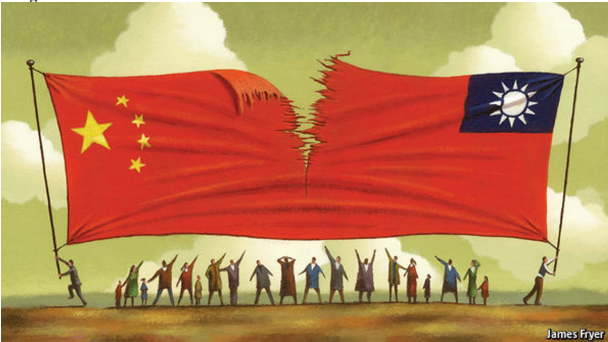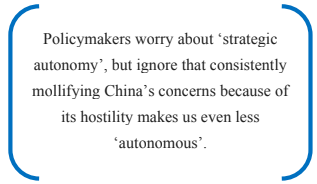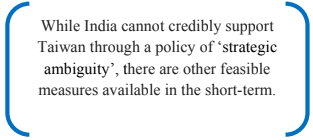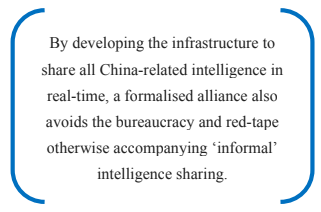Samanvya Hooda, Research Assistant, ICS

The Galwan clash can be a watershed moment for engagement with China. It is time for our polity to decide whether simply reacting to provocations will continue to be the state of affairs, or if a proactive approach can be adopted.

A simplistic analysis can attribute clashes along the Line of Actual Control (LAC) to an outstanding border dispute, which if fixed can bring about peace. This is inaccurate; the deaths of twenty Indian soldiers and an unknown number of People’s Liberation Army (PLA) troops are not the result of historical animosity, but the geopolitical currents guiding both countries. As some scholars have remarked, China’s desire to dominate the region means it wants the option to escalate at the LAC, and always will. A country with hegemonic dreams will seize every opportunity to exercise dominance. This is exacerbated by rivals building the capabilities to fight back – India’s border infrastructure was bound to evoke Chinese escalation. If India deescalates unilaterally, we should reconcile with being deferential to China’s expansionist policies for the foreseeable future. While developing collaborative strategies to deter China will prompt further backlash, it will also bolster India’s efforts to ensure its sovereignty. Policymakers worry about ‘strategic autonomy’, but ignore that consistently mollifying China’s concerns because of its hostility makes us even less ‘autonomous’.

Broad areas of collaboration
While groupings like the Quad (Quadrilateral Security Dialogue) and a closer US alliance are viable options to contain China, inherent issues in both might take them longer to operationalise. Many have suggested a relook at the One-China policy and improving our Taiwan ties. Attractive as it may be, India alone recognising the legitimacy of Taiwan would not worry China much, and offer very little by way of material gains. However, there are several options below this threshold that merit serious consideration.
India has conducted joint military exercises with the US, Japan and South Korea, but never with Taiwan. This matters as China reportedly has more than 1,500 missiles aimed at Taiwan. India and China both field Russian-origin equipment like Sukhoi jets and soon, the S-400 air defence system. Although the US provides Taiwan with most of its weaponry, India can offer the opportunity to study platforms that may be used against Taiwanese forces. There is room to work together at sea — on coast guard security and with Taiwan’s fledging submarine programme.
There is also an opportunity in the new frontiers of war. Taiwan government networks are reportedly subject to 15 million attacks a month from China, and India has only recently made fledgling steps in developing cyber capabilities. Taiwan’s limited space programme can be boosted by collaboration with the Indian Space Research Organisation (ISRO), and India can be a huge market for Taiwanese technology investments. These developments engender material gains and posturing benefits, both crucial for standing up to China. However, structural problems will cause them years to materialise fully. While India cannot credibly support Taiwan through a policy of ‘strategic ambiguity’, there are other feasible measures available in the short-term. An intelligence alliance with Taiwan would be relatively easy to achieve, vastly improve intelligence gathering/sharing, constitute unprecedented signalling of resolve, and be a significant step towards mitigating Chinese aggression.
Intelligence alliance
The leading intelligence alliance in the world today is Five Eyes, whose constituent countries – the US, the UK, Australia, Canada and New Zealand — share primarily signals intelligence. Its enduring success lies in the ability to divide limited resources on common areas of concern, while still ensuring complete intelligence coverage. A similar arrangement between India, Taiwan, and perhaps Japan would amplify each country’s intelligence capabilities exponentially.

Some reports indicate Taiwan and India have exchanged intelligence in the past. The covert nature of this cooperation necessitates negligible signalling, with material gains also affected by the lack of official communication channels. Taiwan’s security establishment is almost entirely focussed on the Chinese threat, and can relieve pressure on India’s intelligence network, overextended as it is over two hostile threats on its borders. India’s superior satellite reconnaissance abilities can significantly improve Taiwan’s intelligence network over China, with both countries combining resources in signals intelligence. By combining their intelligence assets and creating channels for a continuous exchange of communications, electronic, geospatial, and human intelligence, the two countries together can achieve better coverage of China than they can individually. By developing the infrastructure to share all China-related intelligence in real-time, a formalised alliance also avoids the bureaucracy and red-tape otherwise accompanying ‘informal’ intelligence sharing.
Japan will certainly be a welcome addition to this alliance, bolstering a united front against China. It would contribute an estimated 19 signals intelligence stations (possibly the third largest in the world) and an extensive underwater surveillance system, among others. India is inducting a variety of electronics intelligence, imaging, and communications satellites for better surveillance. Taiwan is understood to have some of the best human intelligence assets operating against China. While some areas will undoubtedly overlap, constant intelligence sharing between the three countries can result in near-absolute situational awareness of China.
All three countries are on the front line of China’s aggression, and face the brunt of its expansionist policies. Arguably having the most to lose from Chinese hostility, they should be the first to consolidate a containment policy. Why should there be any unwillingness to do so? They have no divergent national interests, or prevailing historical antagonisms. They all face a unifying, substantive threat to their national interests, and all three have a great deal to gain from an intelligence alliance. Other regional countries such as Singapore, Vietnam, and Australia should also be extended invitations in the future. In time, this alliance may even grow to be a third-party grouping to Five Eyes.
A formal and publicised alliance indicates a clear shift away from tip-toeing around policies to deter China. An alliance is more permanent than vague MoUs, and unlike initiatives like joint military exercises cannot wax on and off depending on the polity’s slightest whims (or under threats from China). Presenting a credible, united front also emboldens countries
otherwise struggling to hold China at bay. This trilateral can also be used to posture as a precursor to a possible military alliance, and hence be used to extract concessions from China. By stepping up the escalation ladder and threatening to step further, it would be among the few instances where India, Taiwan, and Japan will own the initiative, rather than only reacting to Chinese actions.
Arresting China’s hostility
Realising that China’s trajectory is inimical to India’s interests allows one to prepare for challenges in the future. Ignoring it and changing nothing may appear a more comfortable option now, but will encourage China to continue its grey zone tactics against India. Efforts such as diluting the One China Policy will undoubtedly draw China’s ire in different ways.India will likely see an escalation in border incidents, Indian Ocean troubles, and Pakistan also joining the fray. But by expanding the scope of possible actions against China, India has more options by which to escalate/de-escalate. This will vastly improve our negotiating position, which is abysmal at the moment. Instituting proactive measures like the intelligence alliance will provide us the tools with which to defend against China, and its constant and inevitable hostility.
Avoiding war while attaining one’s goals is the most desired form of strategy, whether according to Kautilya, Sun Tzu, or Machiavelli. Former National Security Adviser Shivshankar Menon has hinted China might be “flaunting ambition” too early. Time will tell – but we can’t afford to wait and find out.
Originally published as ‘To check China’s hostility, India, Taiwan and Japan need an intelligence-sharing alliance’ in The Print, 26 June 2020